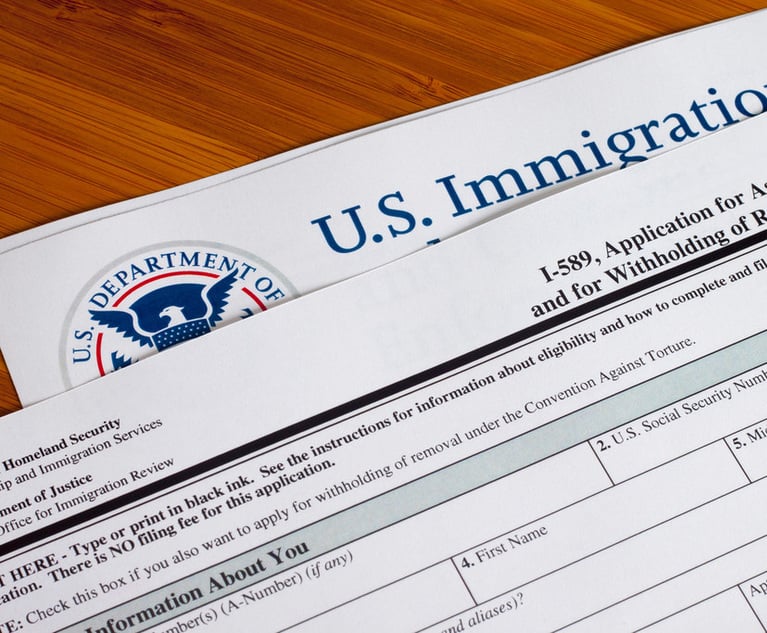History Repeats Itself With More 'Mockingbirds' to Kill
So what should the model be for lawyers today? Should we adopt Atticus Finch's model of compromise and quiet service while hoping and waiting for change or Thurgood Marshall's full-frontal attack on injustice?
February 22, 2018 at 10:55 AM
5 minute read
 Mark Dubois
Mark Dubois A lot is being written about Harper Lee's “To Kill a Mockingbird” these days. With an administration in Washington that many believe tolerates—if not actively supports—white supremacy and with lawyers figuring prominently on both sides of the recent events surrounding free speech vs. hate speech, revisiting this classic may be in order. Though for different reasons than initially thought, the book may be as relevant today as it was nearly 60 years ago when it was first published.
There seems to be a “Mockingbird” rebirth lately. Jeff Daniels just signed on to play Atticus Finch in an upcoming Broadway adaptation. Many wonder if he'll be able to fill Gregory Peck's shoes. Maybe he'll bring a bit more frailty and self-doubt to the role. School districts are reportedly again considering whether to remove the book from their required reading lists for young adults. Some argue that its language may be unsuitable for classrooms. Others worry that its tendency to leaven its treatment of the Ku Klux Klan might be confused with an official endorsement of the organization. The first anniversary of the celebrated ethicist Monroe Freedman's death reminds us that he and others found much to criticize in Lee's hagiographic portrayal of her father.
Like many lawyers, I was long a Finch supporter. Then I read the prequel to “Mockingbird,” which was discovered and published in 2015 as “Go Set a Watchman.” The book was Lee's first attempt to novelize her father's life as a small-town southern lawyer during the Great Depression, tapped to try a rape case involving a black man. In it, Lee paints him to be much less the quiet hero played by Peck and much more the amoral compromiser that Freedman found him to be, too quick to explain away prejudice, at best condescendingly tolerant of black folks, and quietly supportive of a white establishment that included Jim Crow, terror and vigilantism.
“Watchman” proves that Freedman was right when he smelled something not quite right in Finch, even the rewritten and drastically softened portrayal in “Mockingbird.” It's possible that underneath the quiet gravitas of Lee's hero remained the heart of either a Quisling or a racist.
Others, less quick to condemn, will argue that context is everything and urge us to consider Atticus as a flawed man in a flawed system, doing his best to provide for his family while maintaining the ideals of the profession and quietly promoting change. Not everyone was as accommodating as Finch however, and there are other models of dealing with injustice.
A short decade after the time portrayed “Mockingbird,” Thurgood Marshall came to Bridgeport to try a similar rape case on behalf of a black man, Joseph Spell, for whom the nascent NAACP provided free counsel. These events are portrayed in the excellent film “Marshall,” written by our own Michael Koskoff. Its portrayal of how differently such cases could play out from “Mockingbird” with different lawyers and different models of lawyering defending the accused is fascinating. While Finch worked within the confines of his environment, Marshall stormed the barricades, giving quarter to none.
Few had any inkling that within two years of the release of “Watchman” we would see the president of the United States on national TV defending the armed, torch-bearing Nazi and white supremacist marchers in Charlottesville, Virginia, as “very fine people.” It seems that in some places, the animus and segregation of the postreconstruction South is still alive and well. If any good comes from overt presidential support of white nationalism, it may be that many of us will have to come to grips with the idea that something like a third of our countrymen actually support such beliefs, as abhorrent as they might be. (It's no coincidence, by the way, that Trayvon Martin's parents have a small cameo role in “Marshall.” Koskoff was reminding us that not much has changed.)
So what should the model be for lawyers today? Should we adopt Finch's model of compromise and quiet service while hoping and waiting for change or Marshall's full-frontal attack on injustice? I've reached the point where I'm pretty good at identifying such questions, but less good at answers.
Refusing to acknowledge the depth and breadth of the chasm that separates us on these issues is not an option. Maybe a robust discussion of issues of race, class, sexuality, justice and injustice with Finch and Marshall as emblematic of opposite approaches might be an interesting approach. I hope the producers of the Broadway “Mockingbird” have the courage and vision to offer us Atticus Finch as something other than a hero, perhaps more an example of how far many of us fall short of the ideals we're supposed to live by than a role model.
Former Connecticut Chief Disciplinary Counsel Mark Dubois is with Geraghty & Bonnano in New London.
This content has been archived. It is available through our partners, LexisNexis® and Bloomberg Law.
To view this content, please continue to their sites.
Not a Lexis Subscriber?
Subscribe Now
Not a Bloomberg Law Subscriber?
Subscribe Now
NOT FOR REPRINT
© 2025 ALM Global, LLC, All Rights Reserved. Request academic re-use from www.copyright.com. All other uses, submit a request to [email protected]. For more information visit Asset & Logo Licensing.
You Might Like
View All
Trump Administration Faces Legal Challenge Over EO Impacting Federal Workers
3 minute read
Settlement Allows Spouses of U.S. Citizens to Reopen Removal Proceedings
4 minute read
Trending Stories
- 1No Two Wildfires Alike: Lawyers Take Different Legal Strategies in California
- 2Poop-Themed Dog Toy OK as Parody, but Still Tarnished Jack Daniel’s Brand, Court Says
- 3Meet the New President of NY's Association of Trial Court Jurists
- 4Lawyers' Phones Are Ringing: What Should Employers Do If ICE Raids Their Business?
- 5Freshfields Hires Ex-SEC Corporate Finance Director in Silicon Valley
Who Got The Work
J. Brugh Lower of Gibbons has entered an appearance for industrial equipment supplier Devco Corporation in a pending trademark infringement lawsuit. The suit, accusing the defendant of selling knock-off Graco products, was filed Dec. 18 in New Jersey District Court by Rivkin Radler on behalf of Graco Inc. and Graco Minnesota. The case, assigned to U.S. District Judge Zahid N. Quraishi, is 3:24-cv-11294, Graco Inc. et al v. Devco Corporation.
Who Got The Work
Rebecca Maller-Stein and Kent A. Yalowitz of Arnold & Porter Kaye Scholer have entered their appearances for Hanaco Venture Capital and its executives, Lior Prosor and David Frankel, in a pending securities lawsuit. The action, filed on Dec. 24 in New York Southern District Court by Zell, Aron & Co. on behalf of Goldeneye Advisors, accuses the defendants of negligently and fraudulently managing the plaintiff's $1 million investment. The case, assigned to U.S. District Judge Vernon S. Broderick, is 1:24-cv-09918, Goldeneye Advisors, LLC v. Hanaco Venture Capital, Ltd. et al.
Who Got The Work
Attorneys from A&O Shearman has stepped in as defense counsel for Toronto-Dominion Bank and other defendants in a pending securities class action. The suit, filed Dec. 11 in New York Southern District Court by Bleichmar Fonti & Auld, accuses the defendants of concealing the bank's 'pervasive' deficiencies in regards to its compliance with the Bank Secrecy Act and the quality of its anti-money laundering controls. The case, assigned to U.S. District Judge Arun Subramanian, is 1:24-cv-09445, Gonzalez v. The Toronto-Dominion Bank et al.
Who Got The Work
Crown Castle International, a Pennsylvania company providing shared communications infrastructure, has turned to Luke D. Wolf of Gordon Rees Scully Mansukhani to fend off a pending breach-of-contract lawsuit. The court action, filed Nov. 25 in Michigan Eastern District Court by Hooper Hathaway PC on behalf of The Town Residences LLC, accuses Crown Castle of failing to transfer approximately $30,000 in utility payments from T-Mobile in breach of a roof-top lease and assignment agreement. The case, assigned to U.S. District Judge Susan K. Declercq, is 2:24-cv-13131, The Town Residences LLC v. T-Mobile US, Inc. et al.
Who Got The Work
Wilfred P. Coronato and Daniel M. Schwartz of McCarter & English have stepped in as defense counsel to Electrolux Home Products Inc. in a pending product liability lawsuit. The court action, filed Nov. 26 in New York Eastern District Court by Poulos Lopiccolo PC and Nagel Rice LLP on behalf of David Stern, alleges that the defendant's refrigerators’ drawers and shelving repeatedly break and fall apart within months after purchase. The case, assigned to U.S. District Judge Joan M. Azrack, is 2:24-cv-08204, Stern v. Electrolux Home Products, Inc.
Featured Firms
Law Offices of Gary Martin Hays & Associates, P.C.
(470) 294-1674
Law Offices of Mark E. Salomone
(857) 444-6468
Smith & Hassler
(713) 739-1250











